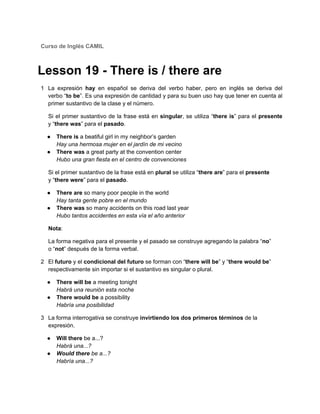
Lesson19 thereisthereare
- 1. Curso de Inglés CAMIL Lesson 19 - There is / there are 1 La expresión hay en español se deriva del verbo haber, pero en inglés se deriva del verbo “to be”. Es una expresión de cantidad y para su buen uso hay que tener en cuenta al primer sustantivo de la clase y el número. Si el primer sustantivo de la frase está en singular, se utiliza “there is” para el presente y “there was” para el pasado. ● There is a beatiful girl in my neighbor’s garden Hay una hermosa mujer en el jardín de mi vecino ● There was a great party at the convention center Hubo una gran fiesta en el centro de convenciones Si el primer sustantivo de la frase está en plural se utiliza “there are” para el presente y “there were” para el pasado. ● There are so many poor people in the world Hay tanta gente pobre en el mundo ● There was so many accidents on this road last year Hubo tantos accidentes en esta vía el año anterior Nota: La forma negativa para el presente y el pasado se construye agregando la palabra “no” o “not” después de la forma verbal. 2 El futuro y el condicional del futuro se forman con “there will be” y “there would be” respectivamente sin importar si el sustantivo es singular o plural. ● There will be a meeting tonight Habrá una reunión esta noche ● There would be a possibility Habría una posibilidad 3 La forma interrogativa se construye invirtiendo los dos primeros términos de la expresión. ● Will there be a...? Habrá una...? ● Would there be a...? Habría una...?
- 2. 4 Para decir “si hubiera”, se usa la expresión “if there were”. ● If there were any problem, Daniel would solve it Si hubiera algún problema, Daniel lo resolvería Expresiones ● There can be Puede haber ● There could be Podría / pudo haber ● There must be Debe haber ● There should be Debería haber ● There has been Ha habido
